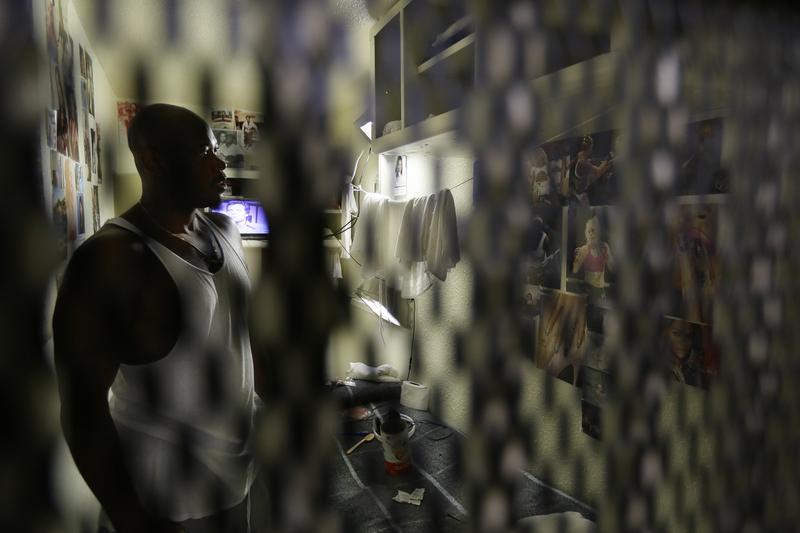BOB GARFIELD:
While technology has somewhat changed the dynamics of protest, the analog route to learning about prison life continues to be a challenge. Restrictive access and interview policies often bar journalists from simply communicating with inmates.
Paul Wright has faced the challenge of reporting on prisons for decades, first as an inmate - he served 17 years for murder - and now as a free man, In 1990, while incarcerated, he launched “Prison Legal News,” a newsletter about criminal justice issues that has grown to be a monthly magazine for readers on both sides of the razor wire.
PAUL WRIGHT: Even though we've had advances in technology that allow for even greater dissemination of information, we've also seen a concurrent crackdown by prison and jail officials limiting the ability of the outside media and the public to do that. Prisoners are generally not legally allowed to have access to the Internet. They’re not allowed to have access to means of mass communication. We've also seen a huge clampdown by prison systems forbidding access to journalists. For example, here in California for we’re going on two decades now, the state prison system has banned any individual interviews by media with individual prisoners. And that's the same across the country, as many, many states do not allow journalists to interview prisoners. They don’t allow them to have access to the facilities. So it’s not just a factor of the prisoners that are hamstrung, it’s also the media that’s very much hamstrung by these levels of censorship.
BOB GARFIELD: Understood, however, you can see how it's in the state’s interest not to be able to have, for example, drug offenders, who represent a pretty large percentage of the prison population, able to continue their nefarious activities virtually from inside prison. So is the trade-off worth it?
PAUL WRIGHT: This is the problem with blanket policies and blanket prohibitions, and this is also what ensures that prisons remain very nontransparent and non-accountable institutions. Nothing illustrates the failure of the so-called “war on drugs” than the fact that drugs are readily available in all of our maximum security prisons in this country. And this preceded the Internet, so I don't think there's necessarily a connection between Internet access and people engaging in criminal activities.
BOB GARFIELD: Well, let's talk about transparency for a moment because the whole notion of incarceration creates some Bill of Rights anomalies. When you are a convicted felon, you surrender a good number of your citizen’s rights. While it's not the NSA, it’s probably in as dark an area from public scrutiny of any governmental institution.
PAUL WRIGHT: I would actually say that there's more reporters dedicated to covering the NSA than there are to reporting on criminal justice issues in the community.
BOB GARFIELD: Because these are public entities, the press has access to certain public records. But is there any compelling constitutional reason that reporters should have access to prisoners whose liberty has been legally taken from them?
PAUL WRIGHT: Sadly, the US Supreme Court says no, but Paul Wright, the journalist, says yes. If you look at the statistical profile of the average American prisoner, it’s someone who's mentally ill, functionally illiterate and chances are they have a substance abuse problem, as well. It's a very vulnerable population. They’re a uniquely vulnerable population. Since the early 1980s, this country’s spent over $1 trillion - that's trillion with a “T” - on building new prisons and jails. It’s our biggest public infrastructure construction project in modern American history.
And yet, these are the facilities that are paid for 100% by taxpayers, yet the representatives of the taxpayers, the media, is generally not even allowed physical access to these facilities that we’ve sunk all this money into. And there’s very little questioning about why this is or why this should be, which I think is even worse.
BOB GARFIELD: So your proposal is, with respect to coverage of prisons and the ability of prisoners to speak to the outside world, what?
PAUL WRIGHT: Journalists should be allowed to have in-person visits and interviews. One of the big things that we face is not allowing prisoners to have access to the Internet and/or email. And I think we need to distinguish too, there’s the communication, I think, that prisoners may want to have, whether it’s with the media or with attorneys or human rights groups, versus the more mundane reality of being able to have contact and communication with their family. That’s kind of a huge thing that often gets left behind in these discussions.
BOB GARFIELD: Well, I must ask - we only found out about the Attica anniversary protest kind of by accident. It made very, very little impact in the media sphere. Was it a flop?
PAUL WRIGHT: I think there's a lot of things that happen where at the time we don't realize the significance of it. For any type of rights type struggle, first you have to have someone saying, we’re entitled to this. You need the first woman that says, women need to be able to vote and then that it might take 30, 40, 50 years for that to actually happen, you don't say, well, the first protest was a flop because they didn't get what they wanted.
BOB GARFIELD: Paul, thank you very much.
PAUL WRIGHT: Thank you very much. Thanks for having me on the show.
[MUSIC UP & UNDER]
BOB GARFIELD: Paul Wright is the founder and executive director of the Human Rights Defense Center and editor of “Prison Legal News.”


